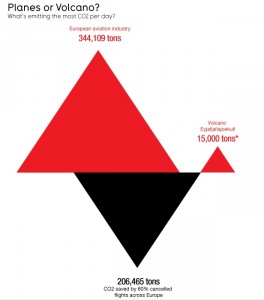Planes, volcanoes and our learning spaces
(Picture from informationisbeautiful.net). I was lucky enough to get away from a meeting in Vienna last week by train to north Germany. many of my colleages were not so lucky and faced a long journey by train and ferry to return to the UK.
There are a number of serious issues raised by the European flight restriction, especially for those of us who work on multi national European projects. typically, these projects involve three or four full partnership meetings a year. Indeed, one way of viewing European projects, especially with the often strange funding rules, is the the EU is providing a large and hidden subsidy to the aviation industry!
Face to face meetings are important for developing and sharing mutual ideas, meanings and trust. And of course there is the oft quoted maxim that the real work gets done on the social time. Whilst I would probably agree, this raises a further issue. If our face to face time is so important – and so expensive in terms of the carbon we generate, do we fully take advantage of this privileged opportunity? To my mind too much time is wasted with business that could easily be conducted on-line. And too little time is spent designing our own face to face learning environments. Conversely, we are failing to seriously develop ideas of how to effectively use video and online modes of communication.
If the Icelandic volcano forces us to think about these issues, it will have been a very valuable learning exercise. I also wonder if we should be forced to consider and report on the cost of all meetings in terms of their carbon footprint. We have to justify them now in purely monetary terms, who not also in terms of their environmental impact? Pontydysgu has a rule of thumb for travel that if a journey can be undertaken by train in six hours or less, then we do not pay for flight tickets. The European Commission could easily introduce a similar rule.


what about the real work during social time? Is there any tool for drinking beers and smoking online?
A good question George – and one that should be taken seriously. We did try around the Jisc emerge project to design a series of online social events In Second Life and using Blip.fm – and we have also used online radio as a social element to conference and meeting agendas. These were not bad ut still not enough. I think we should have a serious look at how we can design more informal social activities online.
You have hit the nail on the head, Graham. Hidden and indirect costs like these are not measured, and consquently “the price is NOT right” (as Anthony Cortese told the EAUC conference in Bangor a few weeks ago). However, I am a bit worried by the notion of carbon trading in general, and specifically by the whole carbon offsets business (I know that you are not suggesting this, but it is a popular fallacy). Building richer virtual worlds (in SecondLife and elsewhere) on the other hand, is a cheap, viable and exciting way forward. Let’s go for it..